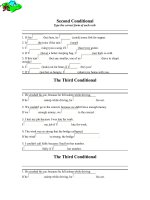CONDITIONAL SENTENCES I
Bạn đang xem bản rút gọn của tài liệu. Xem và tải ngay bản đầy đủ của tài liệu tại đây (178.89 KB, 2 trang )
<span class='text_page_counter'>(1)</span>CONDITIONAL SENTENCES I A. Compare these examples: (1) LISA: Shall we go by bus or by train? JESS: If we go by bus, it will be cheaper. For Jess, it is possible that they will go by bus, so she says: - If we go by bus, it will be..... (2) Lisa and Jess decide to go by train. Later, Jess talks to Joe. JOE: How are you going to travel? JESS: We're going by train. If we went by bus, it would be cheaper, but the train is quicker. Now Jess knows they are not going to travel by bus, so she says: - If we went by bus, it would be …. (not If we go ...) When we imagine something that will not happen, or we don't expect that it will happen, we use if+ past (if we went / if there was I / if you found etc.). But the meaning is not past: - What would you do if you won a lot of money? (we don't really expect this to happen) - If there was (or were) an election tomorrow, who would you vote for? Compare if I find and if I found: - I think I left my watch at your house. If you find it, If I won a lot of money.... can you call me? but If you found a wallet in the street, what would you do with it?' B. We do not normally use would in the if-part of the sentence: - I'd be very scared if somebody pointed a gun at me. (not if somebody would point) - If we went by bus, it would be cheaper. (not If we would go) But you can use if...would when you ask somebody to do something: (from a formal letter) - I would be grateful if you would let me know your decision as soon as possible. C. In the other part of the sentence (not the if-part) we use would ('d) I wouldn't: - What would you do if you were bitten by a snake? - I'm not going to bed yet. I'm not tired. If I went to bed now, I wouldn't sleep. - Would you mind if I used your phone? Could and might are also possible: - If I won a lot of money, I might buy a house. (= it is possible that I would buy a house) - If it stopped raining, we could go out. (= we would be able to go out). PRACTICE I. What do you say in these situations? 1. Of course you don't expect to win the lottery. Which do you say? a. If I win the lottery, I'll buy a big house. b. If I won the lottery, I'd buy a big house. (b. is correct) 2. You're not going to sell your car because it's old and not worth much. Which do you say? a. If I sell my car, I won't get much money for it. b. If I sold my car, I wouldn't get much money for it. 3. You often see Sarah. A friend of yours wants to contact her. Which do you say? a. If I see Sarah, I'll tell her to call you. b. If I saw Sarah, I'd tell her to call you. 4. You don't expect that there will be a fire in the building. W hich do you say? a. What will you do if there is a fire in the building? b. What would you do if there was a fire in the building? 5. You've never lost your passport. You can only imagine it. a. I don't know what I'll do if I lose my passport. b. I don't know what I'd do if I lost my passport. 6. Somebody stops you and asks the way to a bank. Which do you say? a. If you go right at the end of this street, you'll see a bank on your left. b. If you went right at the end of this street, you'd see a bank on your left. 7. You're in a lift. There is an emergency button. Nobody is going to press it. Which do you say? a. What will happen if somebody presses that button? b. What would happen if somebody pressed that button? II. Put the verb into correct form. 1. I'd be very scared if somebody pointed (point) a gun at me. 2. I can't afford to buy a car. If I..........(buy) a car, I'd have to borrow the money. 3. Don't lend Amy your car. If she..........(ask) me, I wouldn't lend her mine. 4. If the computer factory closed down, many people..........(lose) their jobs. 5. I don't think Gary and Emma will get married. I..........(be) amazed if they did. 6. What would you do if you.........(be) in a lift and it.........(stop) between floors? 7. If somebody...........(give) me £10,000, I........have) a very long holiday. III. Write sentences beginning If .... 1. We've decided not to cat ch the 10.30 train. (arrive too early) If we caught the 10.30 train, we'd arrive too early. 2. Kevin is not going to do his driving test now. (fail) If he........................................................... 3. We've decided not to stay at a hotel. (cost too much) If................................................................ 4. Sally isn't going to leave her job. (not I get another one) ................................................................... 5. We've decided not to invite Ben to t he party. (have to invite his friends too).
<span class='text_page_counter'>(2)</span> .......................................................... 6. I'm not going to tell him what happened. (not I believe me) .......................................................... IV. Use your own ideas to complete these sentences. 1. If I won a lot of money,...................................... 2. I'd beveryangry if............................................... 3. If you bought a car, ........................................... 4. I'd be surprised if ............................................... 5. Would you mind if ............................................ V. Complete each sentence giving computer advice , so that it has the same meaning as the first sentence. 1. Don't press that button on the keyboard, or you'll lose what you've written. If you press that button on the keyboard, you'll lose what you've written. 2. Make a back-up copy of your work or you'll lose it. You won't........................................................... 3. You need virus protection to avoid having problems with your computer. If you don't ........................................................ 4. Sitting too long at the computer will make your back and arms ache. You .................................................................... 5. Don't turn off the computer before closing all programs, or you could have problems. You..................................................................... 6. You'll lose your work unless you save it before closing the word-processing program. If.......................................................................... 7. You can save a lot of time by learning the keyboard short cuts. If.......................................................................... 8. Running too many programs at the same time will probably make the computer crash. The computer will.............................................. VI. Complete the sentence with a suitable form of the verb in brackets. THE EARTH AFTER HUMANS If all the people on Earth a (1. disappear)...........tomorrow, nature (2. begin).........to reclaim the planet. For a start, if people no longer (3. pollute)......the atmosphere, the air (4. soon / become) clean again. If there (5. be)..........no people to maintain buildings, they (6. soon / begin)..........to decay, but more solid parts (7. take) thousands of years to disappear. In general, if the 7 billion humans no longer (8. compete)..........with other species on Earth, most species (9. benefit).......... . For example, if humans no longer (10. catch)..........fish, the numbers of fish worldwide (11. eventually / increase)........... However, if humans (12. vanish) from the Earth, endangered species of animals (13. not necessarily / recover)as some are already too few in number. Some endangered species (14. have)...........greater difficulty surviving if no humans (15. take)............the trouble to protect them from other species. Even if we no longer (16. poison).............the planet, several decades (17. go by) before all dangerous chemicaIs. (18. disappear)............ . And even if the burning of fossil fuels (19. cease)...........tomorrow, the ocens (20. not absorb)............all the CO2 in the atmosphere for thousands of years. In the end, though, if alien visitors (21. land)...........on the Earth in 100,000 years time, they (22. find)............no signs that an advanced civilization had ever lived here. ANSWER KEY I. 1. b .2 b 3. a 4. b 5. b 6. a 7. B II. 1. pointed 2. bought 3. asked 4. would lose 5. 'd be I would be 6. were ... stopped 7. gave ... 'd have I would have III. 1. If we caught the 10.30 train, we'd arrive too early. 2. If he did his driving test now, he'd fail (it). (or) ... he would fail (it). 3. If we stayed at a hotel, it would cost too much. 4. If she left her job, she wouldn't get another one. 5. If we invited Ben (to the party), we'd have to invite his friends too. (or) ... we would have to ... 6. If I told him what happened, he wouldn't believe me. IV. Possible answers: 1. If I won a lot of money, I'd buy a new car. 2. I'd be very angry if somebody broke into my house. 3. If you bought a car, it would cost you a lot to maintain it. 4. I'd be surprised if the economic situation improved. 5. Would you mind if I didn't go out with you tonight? V. 1. ...you press that button on the keyboard, you'll lose what you've written. 2. …lose your work if you make a back-up copy. 3. …have virus protection you'll have problems with your computer. 4. ...back and arms will ache if you sit too long at the computer. 5. ...could have problems if you tum off the computer before closing all programs. 6 ...you don't save your work before closing the word processing program, you'll lose it. 7 ... you leam the keyboard short cuts, you can save a lot of time. 8. ...probably crash if you run too many programs at the same time. VI. 1. disappeared 2. would begin 3. Polluted 4. would soon become 5. were 6. would soon begin 7. would take 8. competed 9. would benefit 10. caught 11. would eventually increase 12. Vanished 13. would not necessarily recover 14. would have 15. took 16. poisoned 17. would go by 18. disappeared 19. ceased 20. would not absorb 21. landed 22. would find.
<span class='text_page_counter'>(3)</span>

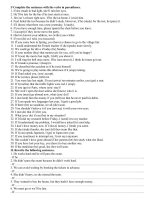
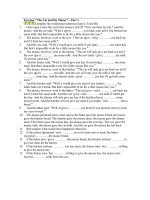


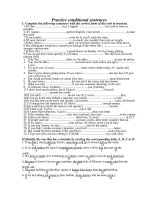

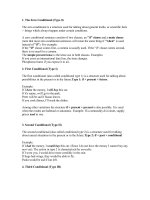
![Tài liệu [Luyện thi tiếng Anh] Unit 5: Conditional sentences doc](https://media.store123doc.com/images/document/13/ce/dd/medium_ddo1387768536.jpg)
